Electric driving – Frequently Asked Questions
Driver's guide
Thank you for ordering your first electric vehicle. Congratulations and welcome to the growing community of EV drivers!You’re on the right path to experience all its advantages: zero CO2 emissions while driving, minimal noise, no smell, no vibration, optimum power as from start-up…
However, driving an EV can be apprehensive for new EV drivers. This guide aims at answering these questions and providing you support in driving and charging your car to enhance your experience.
Going electric
An electric car is a motor vehicle the propulsion of which is partially or fully powered by a rechargeable electrical battery. Unlike a vehicle with an internal combustion engine, an electric vehicle does not have a transmission. There are several types of electric cars, which can be divided into the following categories:
- EV stands for electric vehicle and refers to a fully electric car. Another term for this is battery electric vehicle or BEV. In addition to a BEV, a fuel cell electric vehicle or FCEV is also a fully electric vehicle:
- A battery electric vehicle (BEV) is a fully electric vehicle the wheels of which are propelled by one or more electric motors powered by energy from a battery pack. This battery pack can be recharged at any time. The car produces no direct CO2 of nitrogen emissions.
- o A fuel cell electric vehicle (FCEV) runs on hydrogen and is supported by electric motors. The battery is smaller than that of a BEV and is merely there to complement the fuel cell. The fuel cell converts hydrogen and oxygen into water and electricity. The car cannot be charged at home or on the road. It needs refuelling with hydrogen gas at a hydrogen refuelling station. **
- A Hybrid Electric Vehicle (HEV) runs on both fuel and electricity. It runs mainly on fuel and is supported by a battery. HEVs can be subdivided into two types:
- o PHEV stands for Plug-in Hybrid Electric Vehicle. Some PHEVs have an electric range of up to 100 km. When the battery is empty, the vehicle switches to the internal combustion engine.
- o MHEV stands for mild hybrid electric vehicle. The internal combustion engine of an MHEV is supported by a battery, but the vehicle runs almost exclusively on fuel. The electric motor is used to support the internal combustion engine and reduce emissions that way, rather than power the actual vehicle. You cannot charge an MHEV in the way that you can a PHEV.
An electric car also needs to be serviced. How often this is necessary depends on the make, model and engine. Some EVs have the same maintenance intervals as fuel vehicles, usually between 12.000 and 30.000 km or every 12 months or 24 months, whichever comes first. It is, therefore, important that employees follow the manufacturer’s guidelines and always keep an eye on the dashboard notifications.
The battery of an electric vehicle is sensitive to temperature, especially cold temperatures. It can charge more quickly when it has been preheated in advance. This is particularly important during fast charging. Some BEVs (Battery Electric Vehicles) can use battery preconditioning for this purpose. This can be done using the intelligent preconditioning system via the navigation system or by manual activation.
Installation
| Yes | No | |
|---|---|---|
|
Do you own your home? |
This is a good thing because you must be able to authorise the installation of the charging station, either on the wall of the house or on a post near the parking space. |
Ask the owner of your home for authorisation to install the charging station and pass this authorisation on to your Arval Account Manager. |
|
Are you the owner of the electricity meter to which the charging station is to be connected? |
You must be able to authorise the connection of the charging station to the electricity meter. |
Ask the owner of the electricity meter for authorisation to connect a charging station and pass this authorisation on to your Arval Account Manager. |
|
Do you have a private parking space with access to electricity? |
Charging a vehicle can only be done safely if you have a fixed parking space (personal garage, driveway, personal parking area), which is not located in the public domain and where the charging cable does not obstruct the car, bike and pedestrian traffic. |
You are not able to install a charging station at your home. This does not automatically mean that it is not possible for you to drive an electric vehicle. Depending on your mobility needs, public charging or charging at your place of work may also be suitable. Current ranges allow for more than 300km on a single charge. |
|
Is your private parking space located in an apartment building? |
Ask the co-owner for permission to install a charging station. Please note: Due to the new legislation in Brussels, it is not possible to install a charging station at an apartment building with more than three parking spaces. |
You can install a charging station at your home, as long as the other conditions described here are met. |
|
Is your private parking space located in the basement? |
Check if your insurance and fire department allow the installation of a charging station in the basement. |
You can install a charging station at your home, as long as the other conditions described here are met. |
|
Do you have a single-line diagram of your electrical installation? |
To certify the extension to your existing electrical installation, the certification body may require the production of the single-line diagram of your electrical installation, which must comply with the RGIE (General Regulations for Electrical Installations). |
If you no longer have this diagram, you may have to call in an electrician to draw a new one. Then you will have to call in a certifying body to certify the installation on the diagram. |
|
Are your electricity meter and fuse panel in the same room and on the same floor as your parking space? |
The path between these elements and the charging station to be installed should be as direct as possible. We have allowed for 10 m of cable for the connection of the charging station and one horizontal non diamond hole. Any installation requiring more than one hole or a length of cable greater than 10 m will result in additional costs. Likewise, installing the charging station on a pole incurs an additional cost of min. EUR 500 excl. VAT compared to the installation of the charging station on a wall. |
|
|
Does the capacity of your electrical connection allow the installation of a charging station? |
Most domestic electrical installations are sufficient. Optimised charging (start of charging) and balanced charging (DLB) contribute to safe charging. If you do not have appliances that are large consumers (heat pump, jacuzzi, swimming pool, sauna, etc.), the capacity should be sufficient, and you will not need to extend it. It is considered that a minimum of 16A are needed to charge a vehicle. A meter upgrade is expensive and not always necessary. Your network operator (Fluvius, Ores, Sibelga, etc.) can provide you with information on this subject. |
|
After a preliminary evaluation (on-site/by video call), an installation date is agreed with you in advance. This is followed by an appointment with an independent body that certifies the installation. This body checks that the installation was done correctly and gives advice if certain elements are not as they should be. You remains responsible for the overall electrical installation.
If a standard home charging station’s installation is not possible, additional charges will apply. You will receive a quote for these charges, which you has to sign and return. If a standard home charging stations installation is possible, there are no extra charges on top of the basic installation costs.
A standard installation is followed where possible. This includes:
- Wall mounting of one charger with one connector.
- Cabling (XGB 5G6 mm²) between the charging point and distribution box (max. 10 m).
- Max. one wall drill hole for the cable (no diamond or directional hole).
- Max. 10 m mounting tube for the power cable (max. diameter of 25 mm).
- A type A differential switch max. 30 mA 4P.
The home's power supply must have the capacity necessary to meet the electrical needs of the charging stations to avoid any short circuits. It must also meet the Belgian General Regulations for Electrical Installations (Algemeen Reglement op de Elektrische Installaties (AREI)/Règlement général sur les installations électriques (RGIE)). A charging stations can be single-phase or three-phase. Advice on this will be provided during the pre-installation meeting. This depends on parameters such as the presence of large energy users (sauna, swimming pool, etc.), the vehicle chosen, the charging capacity desired, etc.
Is a neutral conductor always required?
Most electric cars require a neutral conductor for charging. A neutral conductor is required for certain electrical systems, including many EVs with AC charging. Some homes, particularly in Brussels, have a three-phase network without a neutral conductor (for example 3x230 V). In this case, only one-phase charging will be available to the employee and not three-phase charging.
If analysis shows that the electrical system needs to be modified, an estimate of the costs for such modifications can be prepared.
Depending on the car policy, these costs may be charged to the employee. If the regional grid operator (Fluvius in Flanders, etc.) needs to get involved, these additional costs will not be invoiced via Arval.
The compliance of the electrical system and the use of the Arval Smart Cable are your responsibility. If in doubt, contact an electrician.
When the home charging stations has been installed, it must be approved by a technician for certification. In Belgium, there are regional registration requirements for all electric charging points depending on the local grid operator. We, therefore, recommend that you contact your grid operator to make sure that it complies with local legislation. Finally, you must inform your insurer of the home charging station’s installation so that the charging station can be included in your fire insurance policy.
If a charging station needs to be installed at a rental home, it is advisable to have an on-site technical audit carried out by a technician. Then provide Arval with the written consent of the property's owner and/or property administrator.
Note: According to the regulations, it is not possible to install a home charging stations at an apartment building that has more than three parking spaces in Brussels.
You own an apartment
If the charging stations can be connected to your personal electricity meter, this should not be a problem. If the charging stations is installed in a common area of the building and/or the electricity meter does not belong to you, Arval requires the written consent of the building's owner and/or manager.
Note: Due to the new regulations, it is not possible to install a home charging stations at an apartment building that has more than three parking spaces in Brussels.
You own a terraced house
A vehicle can be charged safely only if you have a dedicated parking space (private garage, drive, private parking space) that is not in a public place and where the charging cable does not interfere with motorist, cyclist and pedestrian traffic.
It is possible to install two charging stations at a home if the electrical system allows this. However, given the high consumption of a home charging stations, the costs associated with this are very high and this is not recommended. If there is already a home charging station present, another household member may use it in certain situations.
Find out more about the options under 'May one of my household members use my home charging stations?'.
It is not possible to install a charging station at a family member’s house or anywhere other than at your residence.
Arval charging pass
Arval offers a public charging pass, the Arval Energy Pass. Depending on the home charging station provider, the charging pass is issued by 50five or Luminus. If you received a public charging pass from Arval and do not have a home charging station, the charging pass is issued by Shell.
Arval Energy Passes issued by 50five and Shell are active immediately. For a charging pass issued by Luminus, you receive a link that you can follow to activate the pass.
Use of the Arval public charging pass is unlimited. There is no limit.
If you experience any issues with your charging pass, please contact Arval Driver Care at drivercare.be@arval.be or +32 2 240 01 99.
As with a fuel card, a charging pass may be used solely by you and may not be used by any third parties. If you have a home charging station, you can order a charging pass for another household member.
If your employer allows charging at public charging points, you have access to all charging stations with which your provider has an agreement. The tariffs for charging sessions at public charging points are significantly higher than those for charging at home or at the office.
Immediately contact Arval Driver Care at drivercare.be@arval.be or +32 2 240 01 99. Arval will then block the charging pass and request a new one.
Charging
You can use alternating current (AC) for slow charging or direct current (DC/CCS) for fast charging the electric vehicle.
| Alternating current (AC) charging: slow charging | ||
| Slow charging (Level 1) | Moderate charging (Level 2) | |
|---|---|---|
| Plug types | Standard household outlets (Type A, B or G) | Type 2 connector for Europe |
| Charging connector | 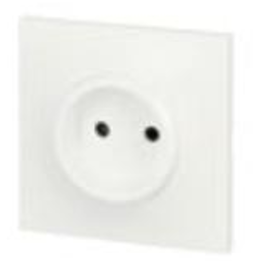 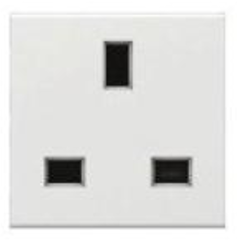 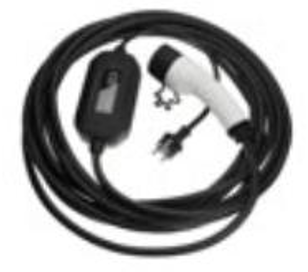 |
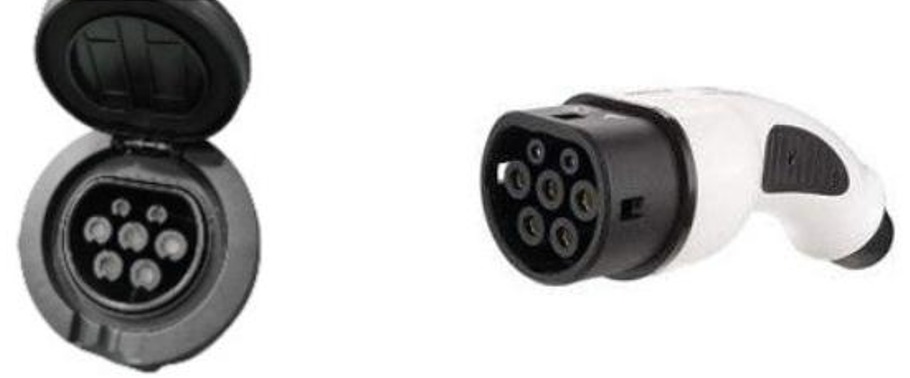 |
| Power rating | 2-2,5 kW | 7 kW is the most common (3,7 kW, 11 kW and 22 kW also available) |
| Charging speed | Adds ~3-8 km (2-5 miles) of range per hour of charging | Adds ~16-48 km (10-30 miles) of range per hour of charging |
| 20-80% charging time | ~8-20 hours depending on battery capacity |
~3-8 uur depending on battery capacity |
| Availability | At home or any standard electrical outlet | At home with dedicated charging stations, workplaces, and public charging stations |
| Direct current (DC) charging: fast charging | ||
| Fast charging | Ultra fast charging | |
| Plug types | CCS (Combined Charging System), Tesla Supercharger | CCS, Tesla Supercharger V3 |
| Charging connector | 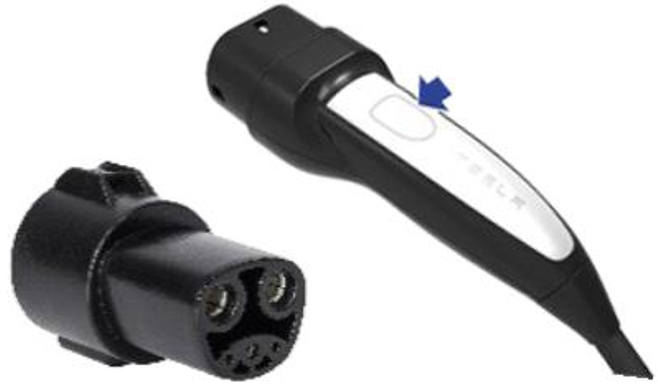 |
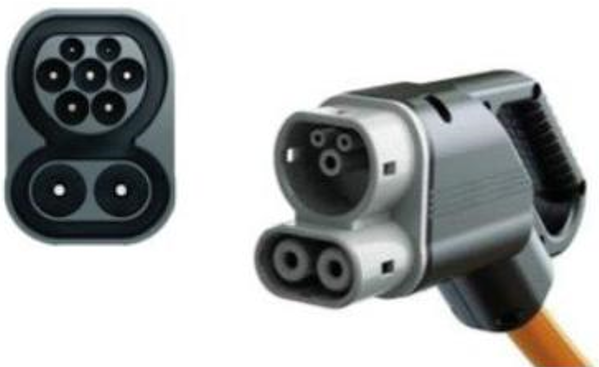 |
| Power rating | 50 kW | 150 kW to 350 kW |
| Charging speed | Adds ~95-130 km (60-80 miles) of range per hour of charging | Adds ~290-400 km (180-250 miles) of range per hour of charging |
| 20-80% charging time | ~30-60 minutes depending on battery capacity and charging infrastructure |
20-40 minutes depending on battery capacity and charging infrastructure |
| Availability | At highway rest stops, public charging stations and a few workplaces | Growing network of high-powered charging stations along major highways and urban areas |
You can easily calculate the time that it takes to fully charge a vehicle, considering the charger chosen and its power, by using the following formula:
Vehicle battery capacity (kWh)/maximum charging cable capacity (kW) = estimated number of hours required to charge the vehicle
This calculation gives an indication of the charging time. In practice, the charging time may be affected by external factors such as the ambient temperature and how many vehicles are using a charging station simultaneously. There is a direct correlation between the charging time and the energy that is required to charge the battery.
You can charge up to eight times faster at a charging station than using a normal power socket. Again, it is not advisable to charge the electric vehicle using a normal power socket, as this is not intended for intensive long-term use. Below is an example of how long it takes to charge a 30 kW car battery using a charger (AC) or a normal power socket.
| kW | Duration | Method |
|---|---|---|
| 22 kW | < 1,5 h | Charging station |
| 11 kW | < 3 h | |
| 7,4 kW | < 4 h | |
| 3,7 kW | < 8 h | |
| 2,3 kW | < 13 h | Smart Cable of normal household socket |
Note: Each vehicle has a maximum charging rate expressed in kW. This is the highest speed at which the battery can charge at the peak of the charging process. However, the vehicle does not charge constantly at this maximum rate. Even when using a fast charger (DC) at a higher charging speed, the car cannot charge any faster than its own maximum charging rate.
You can easily calculate the charging time (taking into account the charger and power):
Vehicle battery capacity (kWh)/maximum charging station capacity (kW) = estimated number of hours required to charge the vehicle
Example 1: 11,9 kWh / 3,7 kW = ± 3 hours
Example 2: 90 kWh / 22 kW = ± 4 hours
The capacity tariff is based on your maximum consumption at any one time. The aim is to encourage you to use fewer electrical devices at the same time and to spread your energy consumption as much as possible. The standing network charge in Flanders currently consists of two components: the kWh tariff and the capacity tariff.
The capacity tariff includes your contribution for electricity grid infrastructure adjustments and maintenance. Your peak consumption is the basis for the capacity tariff. If your consumption has high peaks, you will pay more than if you spread your consumption. According to the Flemish Utilities Regulator, formerly known as VREG, the capacity tariff accounts for around 7% of your total electricity bill.
Read more information and tips on charging an electric vehicle and the capacity tariff here below.
Public charging
| Public charging stations | Semi-public charging stations | Fast charging stations | Ultra-fast charging stations |
|---|---|---|---|
| Accessible to everyone, open 24/7 | On private property but accessible to anyone | From 23 kW | From 150 kW |
| Mostly located in public spaces | Available at least ten hours a day | ||
| Visible in mobile applications | Not visible in mobile applications |
This number is constantly evolving. In late June 2024, there were already 14.606 public charging points in Flanders. This is three times more than in 2020, when Flanders had 4.270 public charging points. In 2023, Wallonia had 5.000 charging points. These numbers will increase even more in the future.
You can charge your electric vehicle at public charging stations with your personal charging pass. Arval offers the Arval Energy Pass. The Arval Energy App guides you to the nearest charging point. It has a fast search engine and a clear map, which is linked to Waze. The app provides access to different types of charging stations. The application shows the current, maximum charging power (kW) and other useful information about each charging point in real time.
You can use the Arval Energy Pass to charge at a public charging point. Scan the card to start and end the charging session. No PIN code is required to use the charging pass, except when refuelling with the Shell card.
Note: Some charging stations apply an additional charge when the car is fully charged and left occupying a charging station. These charges can be high, so do not occupy the charging bay for longer than is necessary.
This network of charging stations is constantly changing and expanding. The charging pass allows the employee to charge at charging stations of providers such as: Allego, Blink Charging, Blue Current, EVBox, Greenflux, New Motion, Nuon, Schneider Mobility Plus, Ionity, Fastned, Engie, etc.
Use the Arval Energy App to find a charging station in Belgium or the rest of Europe.
The Tesla network is a closed network. To use it, you need to create an account on the Tesla website. To create the account, you need to register a credit card.
You cannot use a charging pass from an external provider (Luminus, 50five, etc.).
If your employer allows charging at public charging points, all the charging stations with which the provider has a roaming agreement are accessible.
The tariffs for charging sessions at public charging points are significantly higher than those for charging at home or at the office.
Charging at home
Yes, in Belgium there are regional registration requirements for all electric charging points depending on the local grid operator. We, therefore, recommend that you contact your network operator to make sure that you comply with local legislation.
Option 1: I wish to keep the subscription via the current charge point operator (CPO*)
If there is an agreement between your home charging station’s CPO and the charging pass provider, you can use the charging station. If that is the case, ask the charging station provider to open up the home charging station and set a tariff for these public transactions.
Option 2: a subscription is taken out with an Arval CPO partner at your employer's request
If you want to take out a subscription via an Arval CPO partner and already have a home charging station from another provider, you can do so with a SIM switch if the conditions are met.
Contact the provider of your charging station to check whether there is an agreement between your charging pass and the home charging station. Consult your car policy to find out the tariff at which home charging sessions are reimbursed. The reimbursements are transferred to the account of the main user who received a home charging station from the employer concerned.
Situation: The home has a charging station under the employee’s Arval lease contract. The household member also has an electric vehicle. There are several options:
Option 1: My household member has an electric vehicle for personal use
An additional charging pass can be ordered from one of our partners for the household member. Contact Arval Driver Care or your home charging station provider directly for this.
Option 2: My household member has a company car and public charging pass from Arval
The home charging station will automatically recognise the household member's charging pass. The household member's charging sessions will be reimbursed to the main user of the home charging station.
Option 3: My household member has a public charging pass from another provider
The household member will be able to use the home charging station if there is an agreement between the CPO* and the LMS portal**. The household member's charging sessions will be reimbursed to the main user of the home charging station.
*The charge point operator, or CPO for short, is the intermediary (provider) that manages the home charging station. The CPO also manages such things as the reimbursement of your home charging transactions through your employer.
**LMS stands for Last Mile Solutions. This is the IT platform on which charging points are registered and managed.
Guests can use your home charging station in the same way as household members can. The home charging station settings must be (semi-)public. All Arval charging stations are set to semi-public by default.
A power of 3.000 W is normally required to charged an electric vehicle for about eight hours (an entire night) to charge. Normal power sockets are not designed for intensive long-term use. Other devices with a similar capacity, such as a boiler, are connected directly to the distribution board and have their own safety circuit.
Some vehicles are supplied with a cable that is compatible with a normal power socket. This cable must be limited to a current between 8 A and 13 A and can be used solely as a backup. The socket and its wiring may not be suitable for charging vehicles. This can lead to a dangerous home situation when charging an electric vehicle. The plug may overheat and cause fire.
In addition, connecting the vehicle to a normal socket does not allow any type of communication or energy management. The manufacturers with which we work, therefore, recommend using a charging station that enables communication between the vehicle and the charging infrastructure.
No, the Arval Smart Cable activates as soon as it is plugged into a socket. For safety reasons, therefore, it is very important to follow the operating instructions in the user manual.
The Arval Smart Cable must be used to charge only the car in the lease contract at your residence. It is not permitted to use the smart cable at other locations or for another private vehicle. In addition, the electricity costs are reimbursed only when the charging session takes place at your residence.
If you want to use solar energy to charge the electric vehicle, you can contact Arval’s partners (Luminus or 50five) or an external partner of your choice.
End of lease contract
The charging pass must be returned together with the vehicle.
The charging pass is linked to both the car and you. The charging pass must be returned together with the car. When you order a new car, you will receive a new charging pass linked to the new car.
When you become the owner of the home charging station at the end of your lease contract and have ordered a new car from Arval, you can take out a paid subscription with one of our providers via Arval.* This ensures the new car's home charging sessions are still reimbursed by your employer. In that case, you will receive a new charging pass. The home charging station is no longer covered by the warranty when its ownership has been transferred to you. Arval will, therefore, no longer cover any technical faults in the home charging station. You can still contact Arval if there are any problems with the subscription via a CPO partner.
The home charging station can be replaced by a new home charging station at your employer's request if the current charging station has become outdated, for example. Replacing the old home charging station with a new one is considered a new installation. This is subject to a charge.
*The charge point operator, or CPO for short, is the intermediary (provider) that manages the home charging station. The CPO also manages such things as the reimbursement of your home charging transactions through your employer.
At the end of your lease contract, you have the option to become the owner of the home charging station. Three months before the end of the lease contract, Arval will send you a document to sign in DocuSign for the transfer of ownership. If you do not wish to become the owner of the home charging station, you may refuse to sign the document by clicking on 'Decline'.
The charging station's transfer at the end of the lease contract is free of charge for you. However, this transfer of ownership results in a taxed benefit-in-kind for you. The home charging station is no longer covered by the warranty when its ownership has been transferred to you. Arval will, therefore, no longer cover any faults in the home charging station. If the lease contract is terminated early, you employer is charged an early termination fee for the home charging station.
Option 1: the home charging station's ownership is transferred to you
If you wish to become the owner of the home charging station, you sign a transfer of ownership document. You become the owner of the home charging station when the transfer of ownership document has been signed. You can also opt for a paid subscription with a charge point operator (CPO*), which can be the current CPO. If you take out a subscription with the CPO, you will receive a new charging pass for the vehicle. If you have a new car on order through Arval, the subscription is managed by Arval and your employer. The home charging sessions for your new Arval vehicle will then be reimbursed by your employer through Arval.
If you do not wish to have a subscription, a technician may need to go on site to ensure that you can use the charging station without a charging pass and without the involvement of a CPO. Your employer will be charged the costs associated with this. In that case, you no longer need a charging pass to charge the vehicle. The vehicle can be charged directly by plugging it into the charging station (plug and charge).
Option 2: you do not wish to keep the charging station
Three months before the end of the lease contract, Arval will send you a document to sign in DocuSign for the transfer of ownership. If you do not wish to become the owner of the home charging station, you may refuse to sign the document by clicking on 'Decline'.
If you do not wish to keep the home charging station, the deinstallation of the home charging station is required. This deinstallation is at your employer’s expense. Our partner will then contact you to schedule an appointment to remove the home charging station. It is not possible to transfer ownership of the charging station to your employer.
*The charge point operator, or CPO for short, is the intermediary (provider) that manages the home charging station. The CPO also manages such things as the reimbursement of your home charging transactions through your employer.
The smart cable is considered a vehicle accessory. It must be returned when the vehicle is returned. If the smart cable is missing when the car is returned, a charge will apply.
You become the owner of the home charging station when the transfer of ownership document has been signed. There are two charging options when ownership of the charging station has been transferred:
- You can opt for a paid subscription with a charge point operator (CPO*), which can be the current CPO. If you take out a subscription with the CPO, you will receive a new charging pass for the vehicle.
- If you do not wish to have a subscription, a technician may need to go on site to ensure that you can use the charging station without a charging pass and without the involvement of a CPO. Your employer will be charged the costs associated with this. In that case, you no longer needs a charging pass to charge the vehicle. The vehicle can be charged directly by plugging it into the charging station (plug and charge).
*The charge point operator, or CPO for short, is the intermediary (provider) that manages the home charging station. The CPO also manages such things as the reimbursement of your home charging transactions through your employer.
Insurance
You must inform your insurer if your home has a home charging station. This may result in additional costs depending on your insurance broker.
Taxation
The benefit-in-kind for a company car is calculated based on:
- The list value of the vehicle
- The CO2 emissions
- The age of vehicle
As an electric car has no CO2 emissions, the minimum percentage of 4% of the list value applies.
The charging station is not included in the taxed value and, therefore, has no effect.
Contact
Om u zo snel en efficiënt mogelijk te helpen, raden we u aan om ons contactformulier in te vullen. Dit telt ons in staat uw vraag grondig te bekijken en indien nodig contact op te nemen. Er wordt een ticket aangemaakt om je vraag nauwgezet te kunnen opvolgen.
Indien u een vraag of probleem heeft met het thuislaadstation is het raadzaam de leverancier van het laadstation rechtstreeks te contacteren. Voor problemen met het laadstation zijn zij vaak beter in staat het op te lossen.
Voor dringende zaken zoals diefstal of verlies van de laadpas of smart cable kunt u contact opnemen met Arval Driver Care via drivercare.be@arval.be of bel naar +32 2 240 01 99.
Why choose Arval?
Why choose Arval?
Reliable leasing partner
With more than 120.000 cars we are the largest leasing company in Belgium.
Besides, we are also a subsidiary of BNP Paribas Fortis.
Peace of mind
We take care of the order, all services and we even take back the vehicles.
So, you can drive with peace of mind.
Full service package included
Depending on your needs, we have the most common services included in the price.
The final choice of services is up to you.
Arval Driving Experience at your disposal
A dedicated team of professionals is at your service for all your questions.
